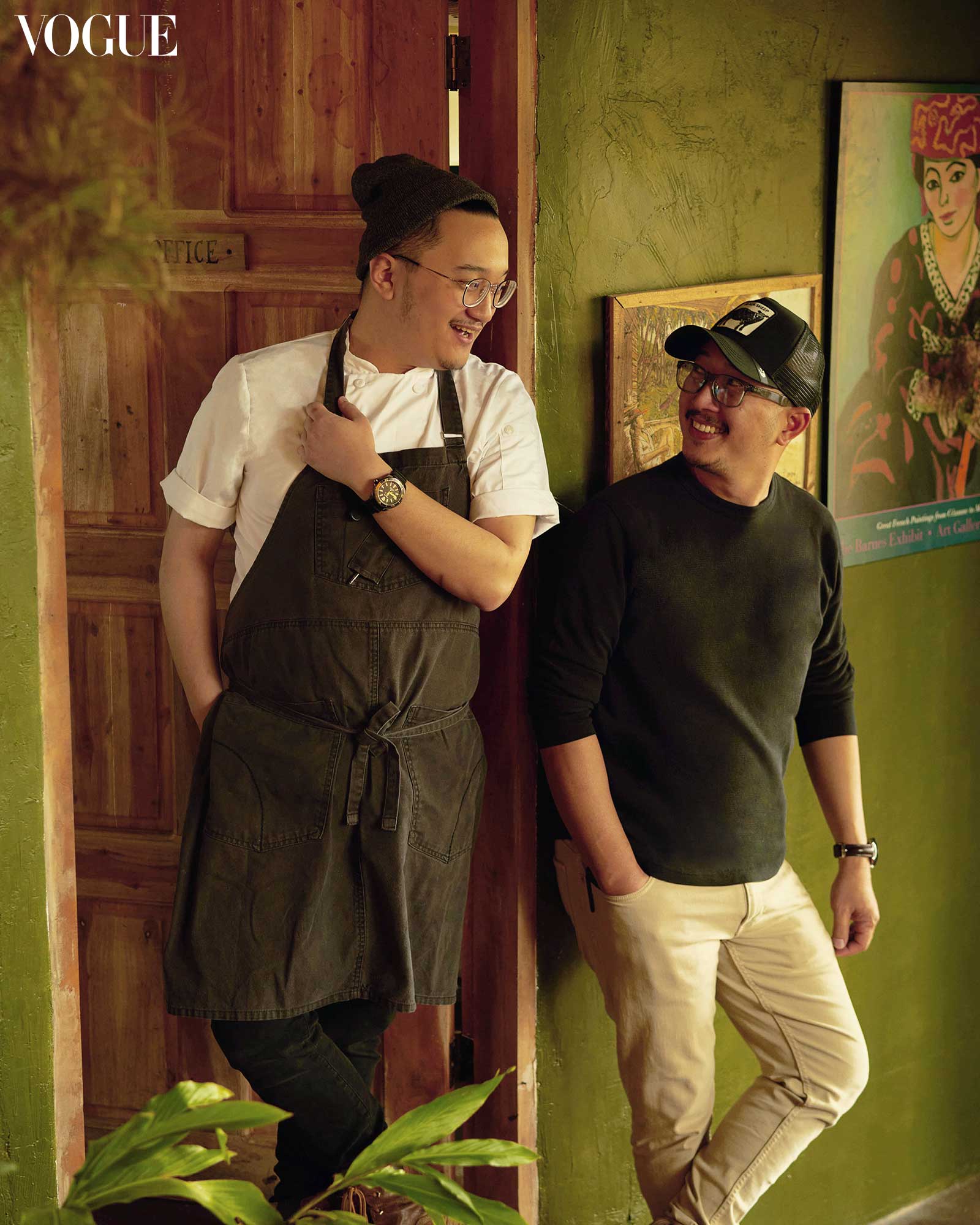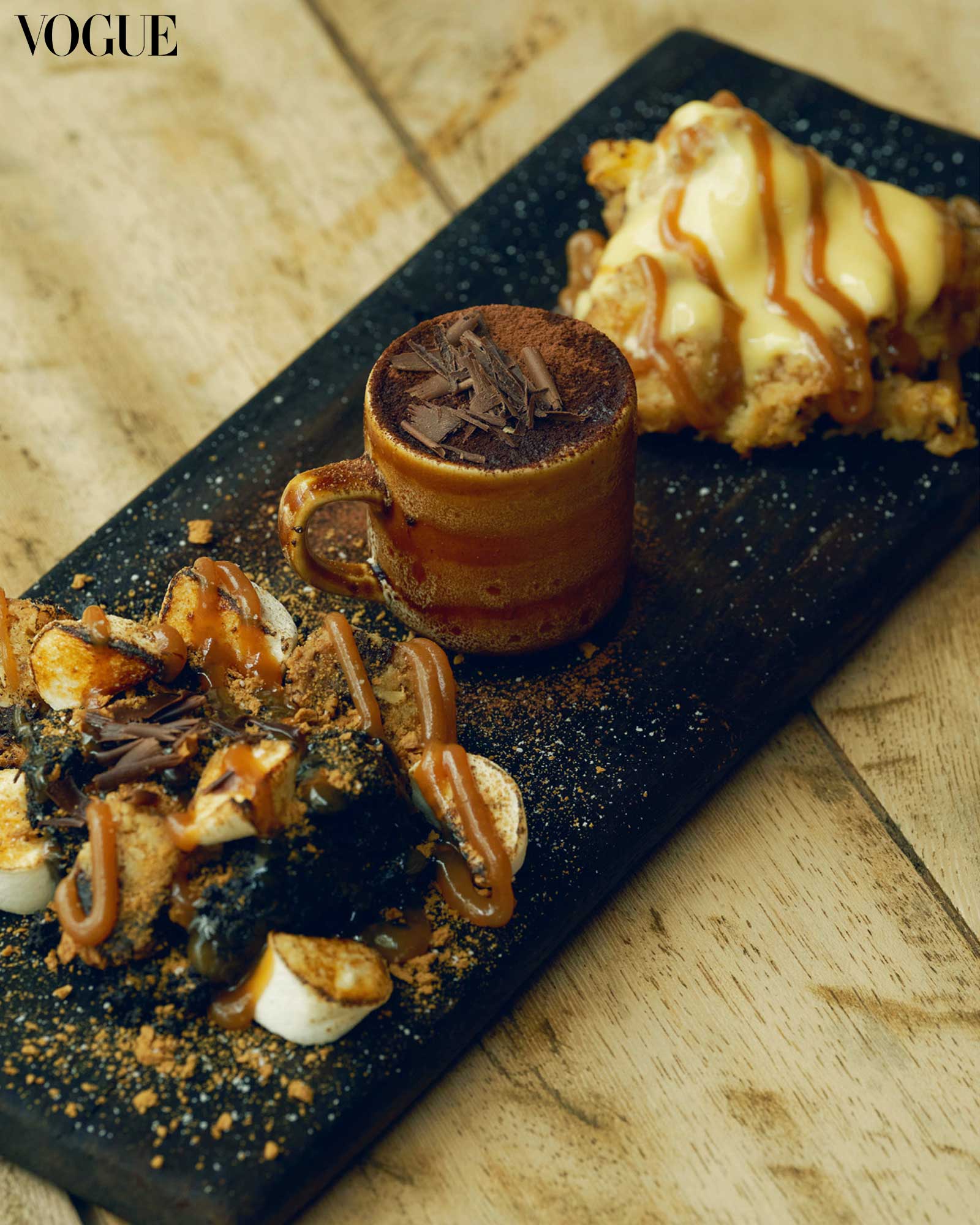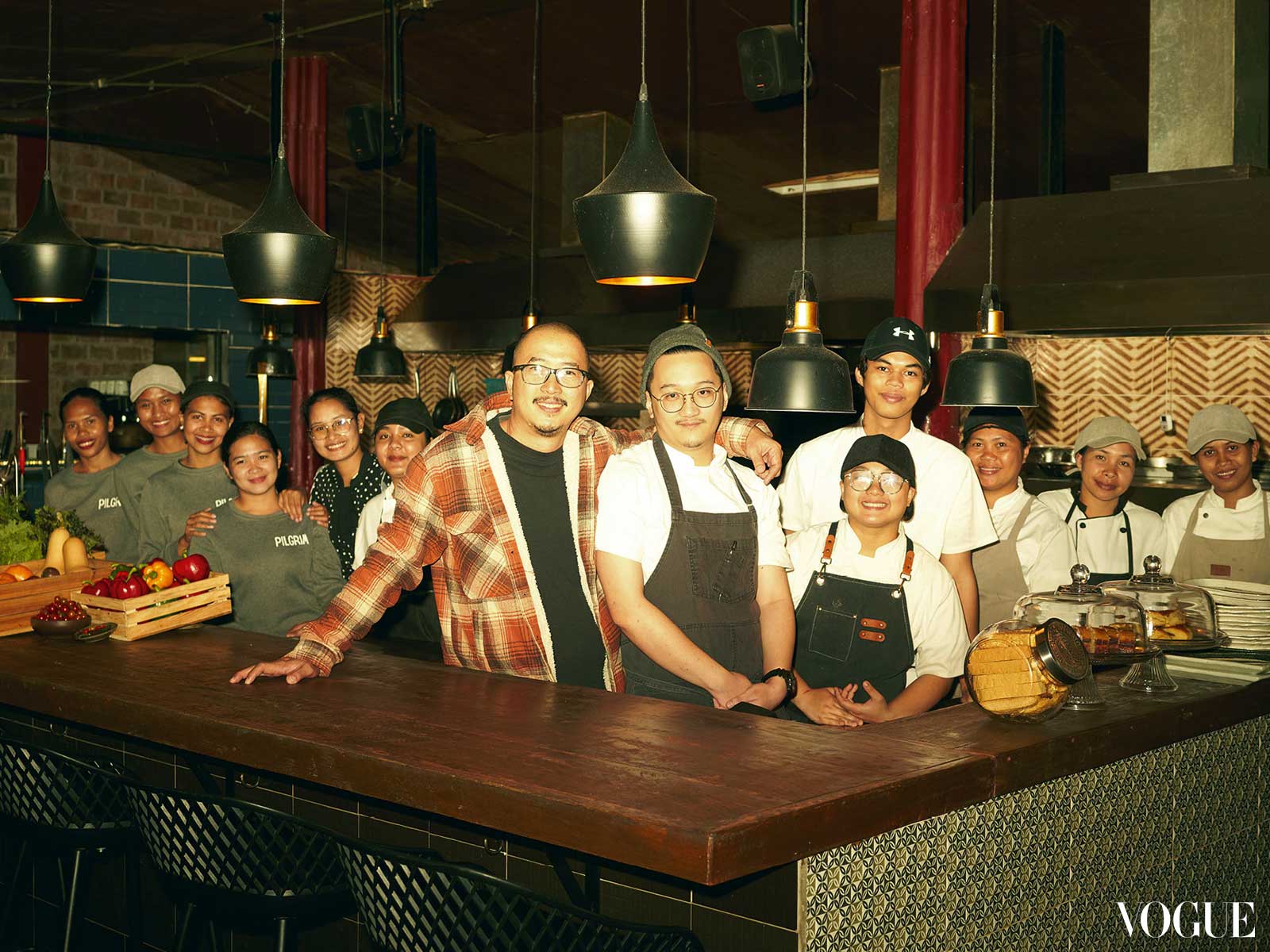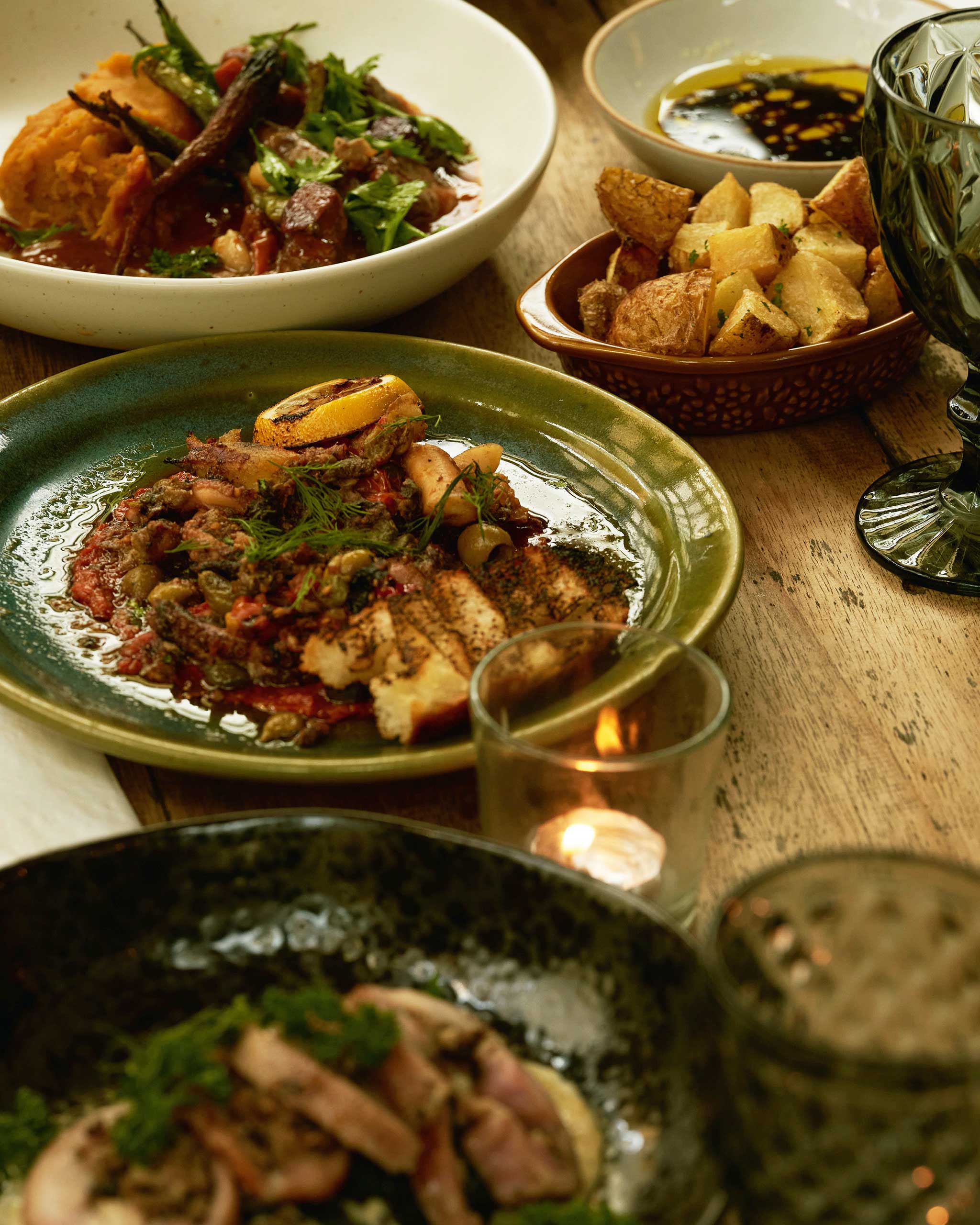Photograph by ARTU NEPOMUCENO
Ask any Davao local about their food scene and they’ll proudly lead you to the Truffle Mushroom Gnocchi and the Budino Tiramisu at Pilgrim Restaurant.
On slow days, Pilgrim plays a mix of soul, funk, and a bit of jazz through the speakers. In the open kitchen, the laidback twang of Vulfpeck’s strings serves as a conductor for the hot plates sailing out into the dining area. Saturday is one of these slow days by the restaurant’s standards: tables become vacant in the restaurant at times—but not for too long.
Pilgrim has become a breakout star in the community of Buda (the border of Bukidnon and Davao) for the past two years. For good comfort food, anyone will point you to their truffle gnocchi and budino tiramisu, dishes born out of executive chef Jeramie Go’s time working for various restaurants in Toronto. Inspired by a city where different cultures converge, he crafted a mixed menu of Mediterranean, Greek, and Italian dishes using produce from the local market and farms.
Jeramie admits that opening this type of restaurant wasn’t easy at first. On his family’s homecoming in 2021, these foreign flavors were new to the locale. They took the risk of introducing the community’s palate to this type of cuisine while also teaching an inexperienced staff to cook flavors that were out of their comfort zone. Most of their employees are locals and Indigenous People who did not have restaurant or hospitality industry experience at all, but he’s taught them skills that he hopes they can take into the future even if they move on from Pilgrim.

“[We were] not only teaching them how to make gnocchi, but we wanted them to understand the flavor. It took us a while, with them slowly appreciating the proper bolognese outside of their usual sweet spaghetti,” Jeramie says. “We opened very silently and low key due to the skill set of our staff. Nobody had prior culinary and restaurant service experience, being locals and IP in the mountains, so we wanted to be able to train them first,” he adds.
For Jeramie, talking about both low and high points of their restaurant is natural as they have nothing to hide; even in the open kitchen, they’re not afraid to let their diners see the mistakes they make (if there are any) and the hard work the staff puts in to serve exceptional dishes.
In the customer’s line of sight, the chef de cuisine, Jeramie’s son Noah, is in the heat of lunch service. Growing up with a father who was an executive chef for various restaurants, cooking has become instinctual.
“Whenever [dad] was home, food was always fun, always different. He would use us kids as his test subjects,” he shares.Those experiments at home find their way on the menu today. “When we were moving back, we were talking about what kind of restaurant we’d put up,” Jeramie says. “I said, ‘let’s just do what we serve in our home in Canada.’”
Years ago, Jeramie and his young family moved to Toronto in search of a better life. “I also wanted to try if I could build a culinary career there, as options were limited in Davao at the time,” he admits. Now that he’s back, he’s able to create those options for the people in Buda.
Noah and his youngest brother were the first members of the Pilgrim team. They helped Jeramie train the staff from scratch. This was new territory for the kids, but it also meant finally having quality time to spend with their dad. Growing up, they understood that the demanding work hours of the kitchen and balancing two jobs in the city stole Jeramie away from the family for most of the time. I ask Noah how it has been, from barely seeing his dad to now seeing him at work everyday and he smiles, “It feels right. I think [my dad and I] have made up for lost time already.”

Through the speakers, the song switches to the cool kicks and hi-hats of an Anderson .Paak groove.
In beat, a plate of hummus garnished with pickled yacon arrives at the table. Then, comes grilled octopus with blistered tomatoes, stuffed rabbit saddle, a board of freshly-baked bread. As if on cue, the famed truffle mushroom gnocchi is served.
It’s easy for word of mouth to exaggerate how good a dish can taste, but this was not the case for Pilgrim. Two years ago on their second week of operations, their place was already packed daily. Jeramie didn’t understand what was happening until they found out from several guests that they were trending online by word of mouth.
Their fresh produce is from local vegetable vendors, with some specialty items coming from Hectares of Hope, a farm an hour away in Calinan. This means they’re able to taste and check the quality of the ingredients themselves.
Snoh Aalegra’s balming vocals play as they roll in dessert: a cross between a custard and a layered espresso cake they call the budino tiramisu, a slice of baklava cheesecake wrapped in crisp phyllo dough, as well as a warm pumpkin spice loaf. If that wasn’t enough, they also served samplers of their moose track s’mores and banana bread pudding.
Pilgrim’s Progress
The relationship between music and food is something many restaurants have explored. Dining is a whole experience, after all. There’s a well-known story about the prolific composer Ryuichi Sakamoto, who once curated a playlist for his favorite Japanese restaurant in New York as he couldn’t bear to eat his favorite sushi with songs that grated his ears. So, the world-famous musician made his own playlist for the chef to use and so he could finally eat at peace.

While none of Jeramie’s family or staff are professional musicians, they’ve curated their playlists simply by their own taste. “My wife especially has a good ear for music. Occasionally, Noah would also contribute when he’s riding along with us,” Jeramie says. During their supply runs to Davao, they’d make playlists out of their favorite songs and sample them in the car, checking to see if they fit the energy they liked for Pilgrim, and then go from there.
So the songs diners hear playing at the restaurant are the same ones the family would pass between themselves in the car. Perhaps the whole idea that they’re serving the food that their family grew up with, and letting diners listen to the music they drive to is what comfort food essentially is.
While their menu cannot be confined to a single category, nor their playlists to a single genre, good food and good taste is just that undeniable for the community. Noah shares that his favorite part about having an open kitchen is that he gets to see the people enjoy what he makes, too. The view goes both ways, and the family pays attention from where they are so that the community eats well at every visit. “We’re not only doing it just for the food. The reason why [we do this] is because we’re here for our family, number one,” he emphasizes.
“Second is giving back to the community. We left the Philippines for something better, it wasn’t for us it seemed, but we still took something out of it and we turned that into what [Pilgrim] is: an opportunity to share our culture, but also help the community and the locals.”

